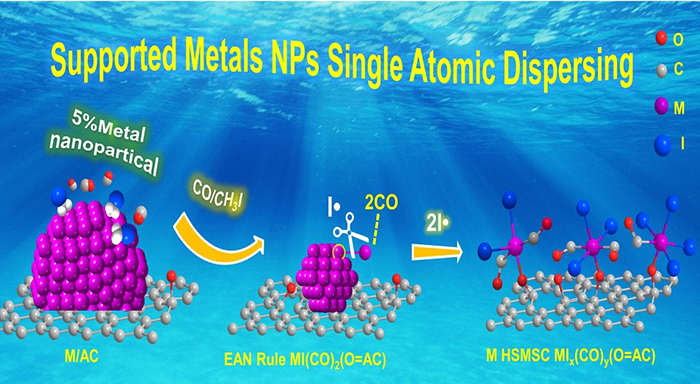Recently, the research group led by Prof. DING Yunjie from the Dalian Institute of Chemical Physics (DICP) of the Chinese Academy of Scientists (CAS) has developed a universal and easily scale-up strategy to atomic dispersed from activated carbon supported noble metal nanoparticles, which was published in Nature Communication.
Supported noble metal catalysts have been used broadly in heterogeneous catalysis, and the catalyst deactivation often occurred due to sintering and agglomeration. Scientists have developed many methods to reverse this process, including oxidation and reduction, chlorination and oxychlorination, thermal treatment with halohydrocarbons.
However, many disadvantages still existed for these methods. The dispersion of nanoparticles (NPs) cannot reach to the atomic level own to the limitation of Ostwald Ripping, the operation conditions are rather harsh and rigorous, often needing very high temperature and one method usually concentrated on a single metal.
In this work, noble metal nanoparticles of Rh, Ir, Pt, Pd, Ru and Ag with 5 wt% loading supported on activated carbon (AC) can be completely dispersed into stable mononuclear complex through the thermal treatment of CO and CH3I. The dispersive process and mechanism are discussed detailed in the case of Rh metal as an example. It is found that the Rh NPs supported on AC could be efficiently transferred into the stable mononuclear complexes of Rh(CO)2I3(O-AC) and Rh(CO)I4(O-AC), in which O-AC represent the oxygen-containing groups on the surface of AC.
The combined action of proper temperature, CO, CH3I and the oxygen-containing groups on the surface of AC are indispensable for the atomic dispersion of supported NPs. Hemolytic cleavage of CH3I on the surface of Rh NPs produces large amount of free radicals (I·). The synergetic effect of CO and I· promotes the breakage of Rh-Rh bond and the formation of mononuclear complexes, leading to the gradual dispersion and decrease Rh NPs. The O-AC provides the anchoring site for the detached mononuclear complexes.

The dispersive process of nanoparticles through the thermal treatment of CO and CH3I mixture. (Image by FENG Siquan)
This work shares a universal and simple strategy to regenerate the sintered catalyst and to synthesize supported mononuclear complexes of most precious metal. It will bring about new insights and points for the design of single-metal-site catalyst. This work was supported by National Key R&D Program of China (2017YFB0602203) and the Strategic Priority Research Program of the Chinese Academy of Sciences (XDA21020300 and XDB17020400). (Text and image by SONG Xiangen and FENG Siquan).